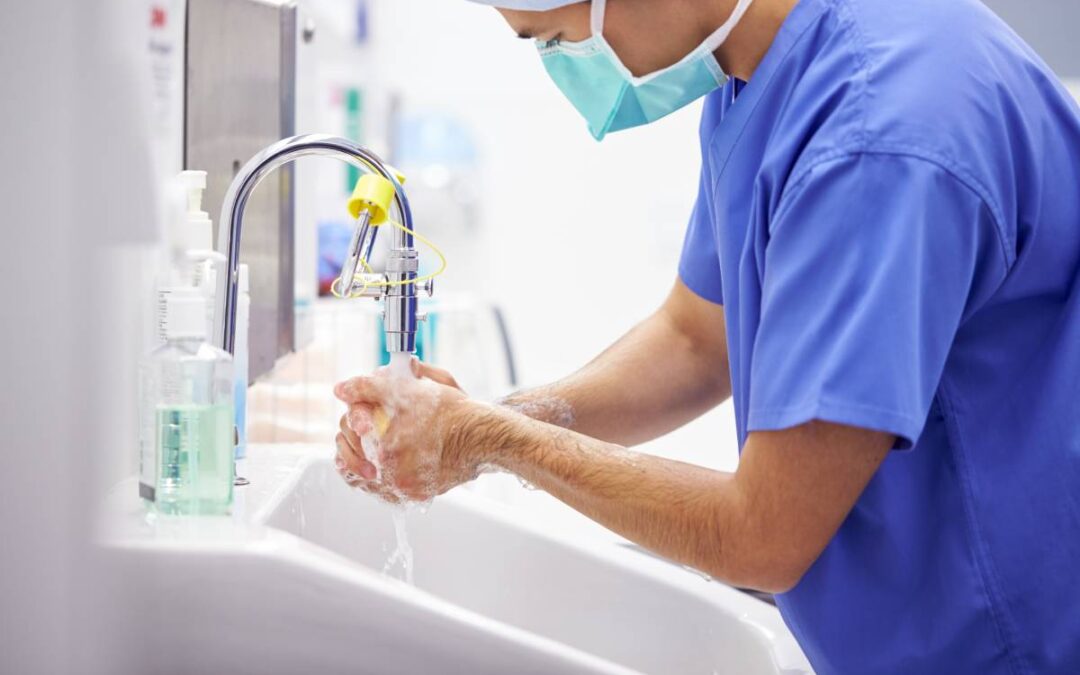Surgical site infection is estimated to affect 2-5% of all surgical patients, which can lead to increased morbidity and mortality for the patients affected.1 The patient’s risk of surgical site infection is affected by multiple factors which can largely be bucketed into two categories, factors related to the patient and factors related to the surgery. Patient factors that can increase risk of surgical site infection include non-modifiable patient factors like elderly age, recent radiotherapy, and a history of skin infection.2 These factors should be identified and taken into consideration before any elective surgeries to assess the patient’s risk of infection. Potentially modifiable patient risk factors include social factors like drug use, dietary interventions, and pre-surgery screening.2,3
The factors that may be most modifiable pre-surgery to reduce the risk of surgical site infection are smoking cessation, nutrition, and MRSA screening. Active smokers, even if they are young and otherwise healthy, are at the highest risk for infection.4 Patients with a history of smoking are at a higher risk than patients who have never smoked, even if they are not currently smoking.4 The American College of Surgeons suggests quitting smoking 4-6 weeks before surgery. In addition to smoking, changes to nutrition pre-operatively can decrease risk of postoperative infection. A 2021 meta-analysis of 178 randomized controlled trials examined the effectiveness of pre-operative nutrition, exercise, probiotics, and education. The researchers found immunonutrition can reduce interventions by 36% while pre/probiotics before surgery can reduce infection risk by 52%.3 Preoperative MRSA screening is another effective intervention to lower the risk of surgical site infection. While routine preoperative administration of vancomycin is not recommended, as its widespread use may lead to more antibiotic resistant strains of MRSA, targeted IV prophylaxis for patients who are already colonized with MRSA has been shown to be effective.5 In a large multihospital study, patients were screened for MRSA colonization before joint replacement or cardiac surgery. Patients who were positive applied mupirocin intranasally twice daily for 5 days and bathed with chlorhexidine-gluconate for 5 days before the operation. As a result of this intervention, the rates of MRSA infection post-operatively decreased for both types of surgeries.5
Some factors related to the surgery that affect surgical site infection rates are surgical preparation, surgery room temperature control and antibiotic prophylaxis. Surgical preparation includes usage of surgical hand scrubs and topical skin preparation. Both waterless chlorhexidine scrub and traditional water-based scrubs have been shown to be effective to lower infection risk.2 Topical skin preparation has also been shown to reduce infection risk, with alcohol-based preparations being more effective than aqueous preparations.6 Current guidelines for antibiotic prophylaxis are based off of the literature demonstrating prophylactic intravenous antibiotics within one hour of incision are effective for decreasing infection risk.2 Temperature control has also been demonstrated to affect infection rate. Intraoperative hypothermia increases risk of infection. In a 2001 study, 421 patients undergoing clean surgeries were randomized to preoperative warming or no warming, which was the standard at the time. 14% of the non-warmed patients developed postoperative infections while 5% of the warmed patients developed infections.6 It is now thought to be best practice to warm patients preoperatively for short cases and to monitor temperature intraoperatively with warming if necessary for longer cases.2
Beyond these factors, other factors hypothesized to affect risk of surgical site infection such as hospital laundering of scrubs, using wound protectors, and changing gloves and instruments for wound closure have not been consistently associated with decreased risk of infection, though many of these studies have likely been underpowered.2 Despite the knowledge about the factors listed above, postoperative infections still occur. Further research in the field is necessary to better understand the widespread and costly issue of surgical site infection.
References
- Fuglestad MA, Tracey EL, Leinicke JA. Evidence-based Prevention of Surgical Site Infection. Surg Clin North Am. 2021 Dec;101(6):951-966. doi: 10.1016/j.suc.2021.05.027. PMID: 34774274.
- Ban KA, Minei JP, Laronga C, Harbrecht BG, Jensen EH, Fry DE, Itani KM, Dellinger EP, Ko CY, Duane TM. American College of Surgeons and Surgical Infection Society: Surgical Site Infection Guidelines, 2016 Update. J Am Coll Surg. 2017 Jan;224(1):59-74. doi: 10.1016/j.jamcollsurg.2016.10.029. Epub 2016 Nov 30. PMID: 27915053.
- Perry R, Herbert G, Atkinson C, England C, Northstone K, Baos S, Brush T, Chong A, Ness A, Harris J, Haase A, Shah S, Pufulete M. Pre-admission interventions (prehabilitation) to improve outcome after major elective surgery: a systematic review and meta-analysis. BMJ Open. 2021 Sep 30;11(9):e050806. doi: 10.1136/bmjopen-2021-050806. PMID: 34593498; PMCID: PMC8487197.
- Hawn MT, Houston TK, Campagna EJ, et al. The attributable risk of smoking on surgical complications. Ann Surg. 2011;254:914-920.
- Schweizer ML, Chiang HY, Septimus E, Moody J, Braun B, Hafner J, Ward MA, Hickok J, Perencevich EN, Diekema DJ, Richards CL, Cavanaugh JE, Perlin JB, Herwaldt LA. Association of a bundled intervention with surgical site infections among patients undergoing cardiac, hip, or knee surgery. JAMA. 2015 Jun 2;313(21):2162-71. doi: 10.1001/jama.2015.5387. PMID: 26034956.
- Maiwald M, Chan ES. The forgotten role of alcohol: a systematic review and meta-analysis of the clinical efficacy and perceived role of chlorhexidine in skin antisepsis. PLoS One. 2012;7(9):e44277.
- Melling AC, Ali B, Scott EM, Leaper DJ. Effects of preoperative warming on the incidence of wound infection after clean surgery: a randomised controlled trial. Lancet. 2001;358(9285):876-880.







Recent Comments